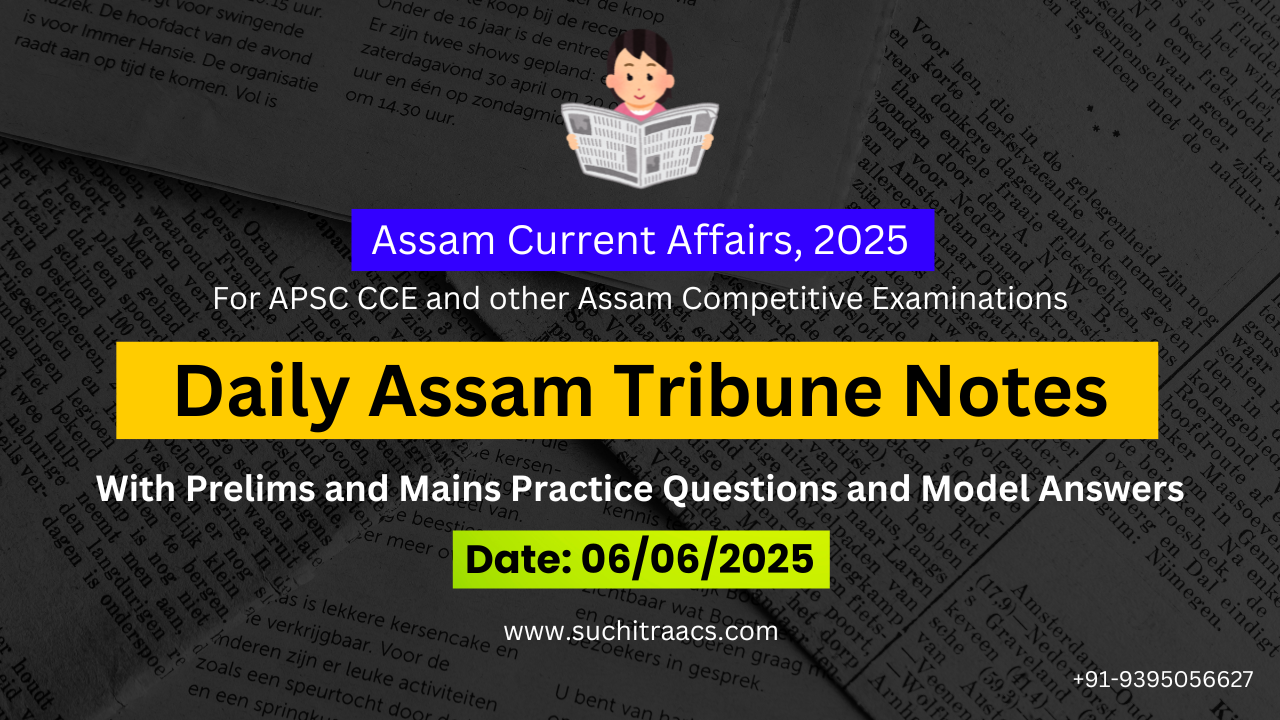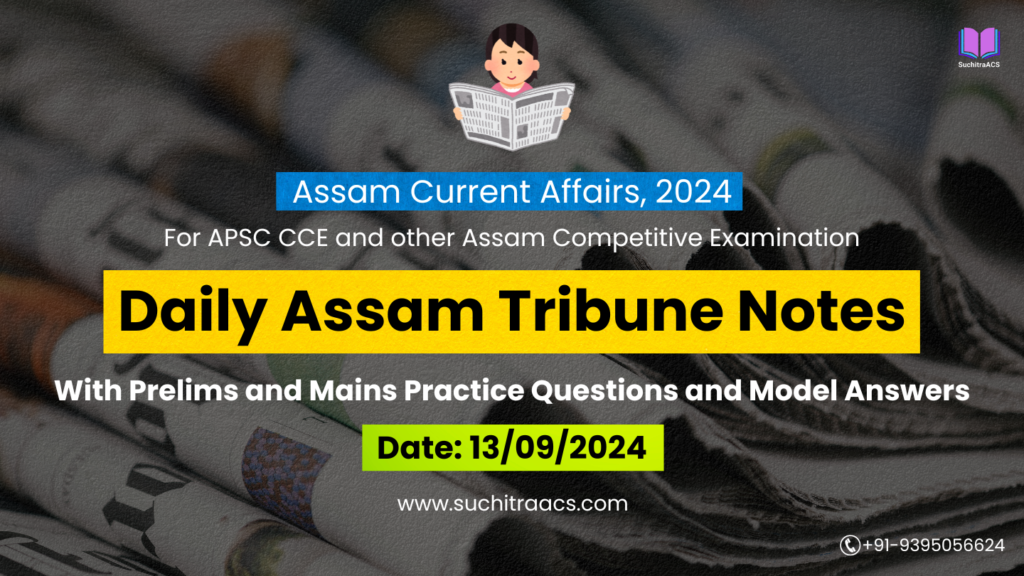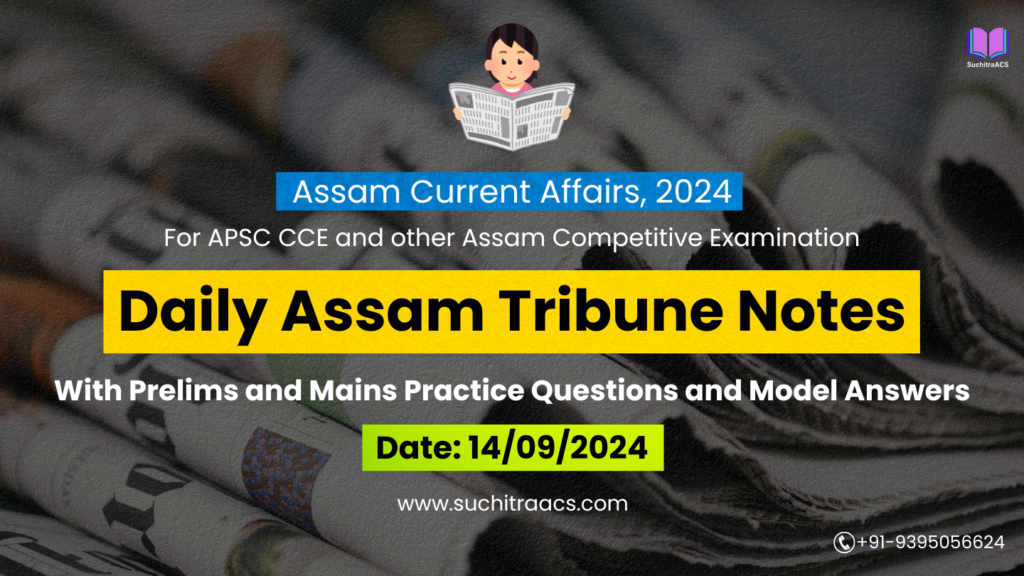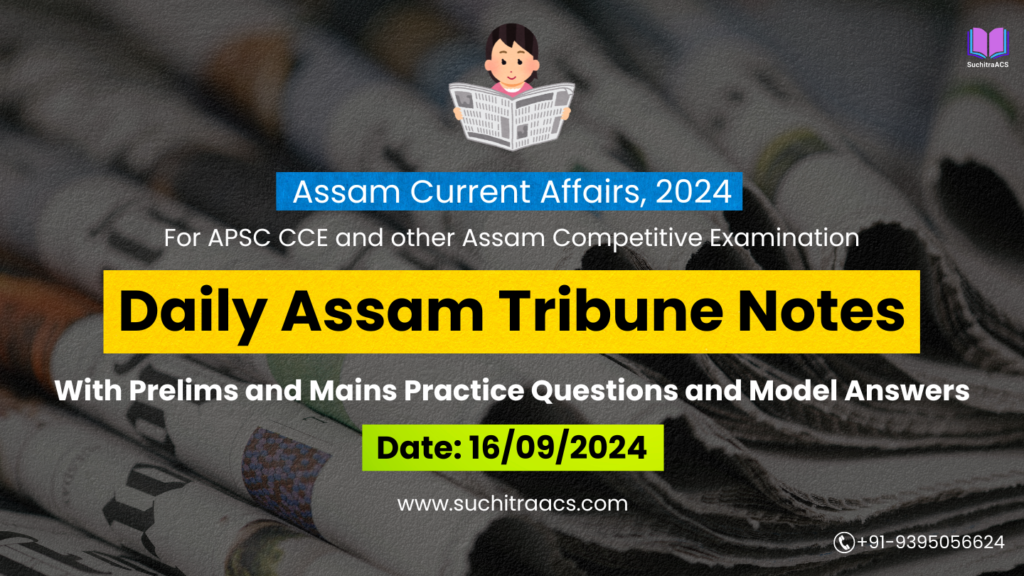APSC Current Affairs: Assam Tribune Notes with MCQs and Answer Writing (06/06/2025)
For APSC CCE and other Assam Competitive examinations aspirants, staying updated with current affairs is vital. This blog covers most important topics from the Assam Tribune today (06-06-2025). These issues are key for both APSC Prelims and Mains preparation, offering insights into the APSC CCE Syllabus.
✨ APSC CCE Online Coaching, 2026

🌳 Assam’s Real-Time Forest Monitoring Portal & Green Initiatives
📘 GS Paper 3: Environment | Conservation | Technology for Governance
📘 GS Paper 2: Government Policies | E-Governance
📘 GS Paper 5 (APSC): Assam – Forest Management | Biodiversity | State Initiatives
🔹 Introduction
On the occasion of World Environment Day, Assam Chief Minister Himanta Biswa Sarma launched a real-time forest loss tracking portal using Artificial Intelligence (AI) and satellite imagery. This marks a significant leap in the State’s fight against deforestation, enabling timely action against illegal encroachment and promoting participatory forest governance.
🔑 Key Features of the Forest Loss Monitoring Portal
| Feature | Description |
| Technology Used | AI + satellite imagery for real-time detection of forest cover change |
| Citizen Participation | New portal allows public to upload photos of tree planting and growth |
| Linked Initiative | “Plant a tree in your mother’s name” campaign inspired by PM Narendra Modi |
| Enforcement Support | Distribution of arms and 130 vehicles to the 3rd Forest Protection Battalion |
| Integration Plan | Expected to be linked with forest range offices and police outposts |
🧠 Prelims Pointers
Forest Survey of India (FSI): Conducts biennial forest assessments
India State of Forest Report (ISFR): Last released in 2023
Assam Forest Types: Tropical moist deciduous, semi-evergreen, and hill forests
Kaziranga & Manas: UNESCO sites highly vulnerable to habitat degradation
CAMPA Fund: Compensatory Afforestation Fund Management and Planning Authority for forest restoration
📝 Mains Pointers
A. Significance of the Portal for Assam
Enables immediate intervention against illegal tree felling and encroachment
Supports data-backed conservation strategies in ecologically sensitive zones
Aids climate change mitigation by protecting carbon sinks
Boosts community involvement in afforestation and monitoring
Strengthens evidence for legal action against defaulters under the Forest Act
B. Challenges in Assam’s Forest Governance
| Issue | Explanation |
| Illegal Logging | Rampant in fringe zones of Karbi Anglong, Dima Hasao, Sonitpur |
| Human-Wildlife Conflict | Encroachment often linked to elephant and rhino corridor disruptions |
| Low Digitization | Forest records still partly manual in several divisions |
| Shortage of Staff | Many forest ranges understaffed or lack enforcement vehicles |
| Natural Disasters | Flooding and erosion degrade forest health (Kaziranga, Majuli, etc.) |
C. Government Measures (2023–25)
Formation of Forest Protection Battalions (3rd Battalion armed and mobilized in 2025)
Ban on 500 ml plastic bottles to reduce drain clogging and urban floods
Collaboration with Oil India Ltd. to produce biofuel from plastic waste (Tinsukia, Guwahati, etc.)
Initiatives to digitize plantation tracking and green cover growth via citizen-uploaded updates
D. Way Forward
📡 Integrate portal with Geographic Information System (GIS) for district-wise forest heatmaps
🌱 Institutionalize eco-club monitoring and school participation in plantation drives
🏞️ Frame District Forest Restoration Plans under the State Action Plan on Climate Change (SAPCC)
⚖️ Deploy mobile forest courts in illegal logging-prone zones for on-site justice
🤝 Foster Panchayat–Forest Department partnerships for joint forest management
📑 Relevant Policies & Frameworks
Forest (Conservation) Amendment Act, 2023 – Re-defined forest land use governance
National Forest Policy 1988 (under revision) – Stresses 33% green cover target
National Mission for Green India – Supports afforestation and eco-restoration
Assam Forest Policy Draft (2022) – Focus on community forest rights and eco-tourism
State Action Plan on Climate Change (SAPCC) – Forests as key climate resilience factor
🧩 Conclusion
The launch of a real-time forest monitoring system marks Assam’s strategic shift towards tech-enabled environmental governance. With growing threats to its unique biodiversity and green cover, such proactive digital tools can transform the way forests are protected, communities are involved, and climate goals are achieved. A green Assam is not just an ecological imperative—it is a generational responsibility.
🏛️ Centre-State Jurisdiction in Policing: CM Sarma Objects to CBI Role in Assam Sexual Assault Case
📘 GS Paper 2: Federalism | Polity | Law and Order
📘 GS Paper 4: Ethics in Governance | Conflict of Jurisdiction
📘 GS Paper 5 (APSC): Assam – Centre-State Relations | Internal Security | Legal Institutions
🔹 Introduction
Assam Chief Minister Himanta Biswa Sarma publicly objected to the CBI taking over the probe into a high-profile sexual assault case in Guwahati without the state’s consent, reigniting the debate over the jurisdiction of central agencies in matters of law and order—a State List subject under the Constitution. The incident raises critical questions about cooperative federalism, procedural propriety, and constitutional balance in policing.
🔑 Key Points
| Element | Description |
| Trigger Incident | Alleged sexual assault of a minor girl at a private residence in Guwahati |
| CM’s Objection | CBI began probe without prior consent from the Assam Government |
| Constitutional Provision | Law and order is a State subject (List II, Schedule 7) |
| Usual CBI Jurisdiction | Operates in a state only with its consent, except when directed by courts |
| Related Legal Provision | Delhi Special Police Establishment Act, 1946 governs CBI’s powers |
| Current Status | CBI continues investigation following High Court directions |
🧠 Prelims Pointers
Article 246: Provides legislative competence (State List includes Police, Public Order)
CBI: Formed under DSPE Act, 1946, not a statutory body under a specific constitutional article
General Consent: States grant CBI permission to operate within their borders; can be withdrawn (e.g., by Kerala, West Bengal)
High Courts and Supreme Court: Can direct CBI probes even without state consent (as per SC ruling in Vineet Narain case)
Federalism Index: NITI Aayog and independent bodies assess federal cooperation across sectors
📝 Mains Pointers
A. Federal Tension over CBI Jurisdiction
CBI requires general or case-specific consent to investigate in states
Withdrawing consent is a tool states use to assert autonomy (9+ states have done this since 2018)
High-profile cases often bypass this by judicial order, creating federal friction
Raises concerns about politicization of investigation and erosion of state control
B. Legal and Ethical Dimensions
| Dimension | Concern |
| Constitutional Ethics | Policing is a state responsibility; any overreach undermines federalism |
| Victim-Centric Justice | Tug-of-war between agencies may delay relief to victims |
| Credibility of State Police | CBI involvement sometimes seen as vote of no confidence in state police |
| Judicial Review | Courts must ensure central probes are not used for political targeting |
C. Assam’s Position and Wider Trends
Assam is among few states that have not withdrawn general CBI consent
CM’s objection suggests institutional overstep, not opposition to justice
Reflects broader trend of centre-state tension in criminal investigations
Important in the context of Assam’s demand for greater autonomy in internal security
D. Way Forward
🧾 Define clear legal thresholds for Centre-led probes into state matters
🧩 Create an independent central-state coordination mechanism for sensitive cases
⚖️ Strengthen State Police capabilities to reduce dependency on central agencies
🧠 Encourage judicial restraint and review to prevent Centre overreach
🤝 Promote cooperative federalism by ensuring mutual consultation in high-profile cases
📑 Relevant Legal Frameworks & Reports
DSPE Act, 1946
Second ARC Report on Public Order (2007) – called for federal balance in policing
Supreme Court in State of West Bengal vs Union of India (2010) – clarified Centre’s limits in state affairs
Prakash Singh Case (2006) – laid down police reforms for autonomy and accountability
National Police Mission Recommendations – encouraged state capacity enhancement
🧩 Conclusion
The CBI’s expanding footprint in state-level criminal cases raises fundamental concerns about constitutional federalism and democratic accountability. While protecting justice is paramount, it must be balanced with respect for institutional jurisdictions and the cooperative spirit of Indian federalism. Assam’s protest is a constitutional reminder—not an obstruction.
🧬 India’s Revised Organ Transplantation Rules: A Lifeline for Assam’s Critically Ill
📘 GS Paper 2: Governance | Health | Government Regulations
📘 GS Paper 4: Ethics in Medicine | Public Service Delivery
📘 GS Paper 5 (APSC): Assam – Health Infrastructure | Ethical Governance | Social Justice
🔹 Introduction
India has notified new rules under the Transplantation of Human Organs and Tissues Act, aimed at improving transparency, accessibility, and affordability in organ donation and transplant procedures. For states like Assam, which lack advanced transplant infrastructure, these reforms are expected to boost cadaveric donation rates, improve inter-state organ sharing, and help economically weaker patients get timely treatment.
🔑 Key Changes in the New Rules
| Provision | Description |
| Eligibility for Registration | All patients across India can register on NOTTO irrespective of domicile |
| Organ Allocation Rule | Allocation based on medical urgency and waiting time, not state preference |
| Financial Relief | Free-of-cost transplants for Below Poverty Line (BPL) patients in govt. hospitals |
| Nodal Agency | National Organ and Tissue Transplant Organisation (NOTTO) to manage the national registry |
| Digital Health Linkage | Integrated with ABHA (Ayushman Bharat Health Account) for real-time tracking |
| Grievance Redressal | State-level Ethics Committees and appellate boards made mandatory |
🧠 Prelims Pointers
THOTA Act (1994): Governs human organ transplantation in India
NOTTO: Apex body under Directorate General of Health Services
SOTTO: State Organ & Tissue Transplant Organisation – Assam is yet to fully operationalize
ABHA Number: Digital health ID under Ayushman Bharat Digital Mission
Cadaveric Donation: Donation from brain-dead individuals; underutilized in India
📝 Mains Pointers
A. Importance of the New Rules for Assam
Assam sees high migration to Kolkata, Vellore, Hyderabad for transplants
Private costs for kidney/liver transplant run into ₹10–₹25 lakh; unaffordable for most
Cadaveric donation in Assam is rare due to awareness, cultural, and legal bottlenecks
Organ-sharing between states (e.g., Tamil Nadu to NE) has faced procedural delays
These rules could enable increased access and transparency for Assam patients
B. Challenges in Assam’s Organ Transplant Framework
| Challenge | Explanation |
| Lack of Transplant Facilities | No fully functional multi-organ transplant unit in state-run hospitals |
| Low Cadaveric Donation Awareness | Cultural taboos and medical legal delays in identifying brain-dead donors |
| Shortage of Trained Staff | Requires specialised ICU, transplant surgeons, and donor counsellors |
| Legal-Administrative Delay | Coordination between hospitals, SOTTO, police, and judiciary is slow |
| Ethical Gaps | Risk of organ commercialization or black-market trafficking |
C. Government & Institutional Measures
Gauhati Medical College (GMC) developing cadaver transplant facility
Inclusion of transplant packages under PM-JAY and Assam Aarogya Nidhi
Collaboration with NOTTO for assisted referrals and donor identification
Awareness campaigns by Assam Medical Council & NGOs in urban areas
Proposal to establish Regional Organ Retrieval Bank (RORC) in Northeast
D. Way Forward
🧑⚕️ Train transplant coordinators and ICU doctors on brain death protocols
📱 Create digital dashboard of waiting patients accessible to all SOTTOs
📣 Launch community awareness campaigns using religious and social leaders
🏥 Fund decentralized transplant centres at Dibrugarh, Silchar, and Barpeta
⚖️ Strengthen oversight by state-level ethics committees to ensure compliance
📑 Relevant Frameworks & Reports
THOTA Act, 1994 (Amended 2023)
National Health Policy 2017 – equitable access to tertiary care
Ayushman Bharat Digital Mission (ABDM) – organ transplant integration ongoing
Justice MB Shah Committee – report on organ trade and ethical loopholes
India Organ Donation Day (Nov 27) – annual awareness initiative by NOTTO
🧩 Conclusion
The revised transplantation rules offer a policy reset to make life-saving organ transplants accessible to all Indians, regardless of geography or income. For Assam, the challenge is to convert this central policy into institutional readiness and community participation. With the right ecosystem, the state can turn scarcity into hope, and policy into life.
📉 India’s Services Sector Growth Slows: Relevance for Assam’s Economy
📘 GS Paper 3: Indian Economy | Services Sector | Employment
📘 GS Paper 2: Government Policies | Economic Planning
📘 GS Paper 5 (APSC): Assam Economy | Regional Disparities | Employment & Migration
🔹 Introduction
India’s services sector growth decelerated in May 2025, according to the HSBC India Services PMI, amid inflationary pressure, weak exports, and a slight dip in consumer sentiment. Though still expanding, the sector’s pace of growth—especially in IT, hospitality, and logistics—has moderated. For a state like Assam, whose service sector is gradually expanding in urban hubs like Guwahati, this slowdown presents both risks and realignment opportunities.
🔑 Key Economic Indicators
| Indicator | May 2025 Status |
| India Services PMI (HSBC-S&P) | Slowed to 60.2 from 61.4 in April (still above 50 = expansion zone) |
| Sectors Affected | Hospitality, finance, IT-enabled services, transport |
| Contributing Factors | Inflation, global slowdown, weaker hiring, drop in export orders |
| Assam Context | Growth driven by Guwahati’s IT, transport, tourism, and education hubs |
| Employment Note | Urban services remain the largest employer in Guwahati, Dibrugarh, Silchar |
🧠 Prelims Pointers
Services PMI (Purchasing Managers’ Index): Measures business activity; above 50 = growth
Tertiary Sector: Includes retail, IT, finance, logistics, education, healthcare, tourism
Assam Economic Survey 2023–24: Services contribute ~49% to Assam’s GSDP
Digital India Initiatives: Helped grow e-services, fintech, and telemedicine in Assam
MSMEs in Services: Make up ~30% of Assam’s registered MSMEs
📝 Mains Pointers
A. Role of Services Sector in Assam
Dominant in urban centres: Guwahati (finance, logistics), Silchar (education), Dibrugarh (healthcare)
Tourism and transport are fast-growing in Barak & hill regions
Digital infrastructure (Airtel/BSNL/CSC) fuels e-commerce, tele-health, e-learning
Contributes significantly to women’s employment, especially in education, healthcare, retail
Growth in services compensates for stagnation in agriculture and limited manufacturing
B. Challenges in Assam’s Services Sector
| Challenge | Description |
| Infrastructure Gaps | Power, internet, road connectivity limits Tier-2 & Tier-3 city expansion |
| Skilling Mismatch | Graduates lack domain-specific skills in fintech, hospitality, analytics |
| Regional Disparities | Concentrated around Guwahati; hills and BTR lag in service penetration |
| Informality | Majority of employment is unorganised, with low job security and benefits |
| Credit Access | Small service providers struggle with working capital, insurance, and tax compliance |
C. Recent Government Measures
Startup Assam Initiative – seed grants for IT and service entrepreneurs
Pradhan Mantri Vishwakarma Yojana – extends to service-linked traditional occupations
Northeast BPO Promotion Scheme (NEBPS) – promotes IT/ITES jobs in smaller NE towns
Skill India + Kaushal Mahotsav – skilling youth in tourism, wellness, retail sectors
PM Gati Shakti Plan – aims to boost logistics and urban transport efficiency
D. Way Forward
🏢 Establish Urban Service Hubs beyond Guwahati: in Tezpur, Jorhat, Karimganj
💼 Align skill training with demand in hospitality, fintech, logistics, and ITES
🌐 Expand broadband and last-mile connectivity under BharatNet and 5G rollouts
👩💻 Foster women-led service startups via SHG–MSME convergence
📊 Create a District Services Competitiveness Index for Assam to benchmark growth
📑 Relevant Reports & Policies
HSBC-S&P India Services PMI Report (May 2025)
Assam Economic Survey 2023–24
National Policy on Skill Development and Entrepreneurship
Digital Northeast Vision Document (MeitY)
MSME Champions Portal – extended to services sector entrepreneurs
🧩 Conclusion
While the national services sector slowdown is a warning signal, it also offers Assam a moment to reshape its regional service economy. With the right policies on urban expansion, skilling, digital infrastructure, and entrepreneurship support, Assam can build a service economy that is inclusive, resilient, and future-ready.
APSC Prelims Practice Questions
✅ Topic 1: Assam’s Real-Time Forest Monitoring Portal
1. With reference to forest governance in Assam, consider the following:
- Assam has launched an AI-powered forest loss detection portal with public participation features.
- The Forest (Conservation) Amendment Act, 2023, allows private companies to manage reserved forests.
- Kaziranga National Park is part of the Eastern Himalayan Biodiversity Hotspot.
Which of the statements are correct?
A. 1 and 3 only ✅
B. 1 and 2 only
C. 2 and 3 only
D. 1, 2 and 3
🧠 Explanation:
- Statement 1: Correct. The portal launched in June 2025 tracks forest loss using AI & allows citizens to upload photos.
- Statement 2: Incorrect. The 2023 Amendment redefined the scope of “forest” but did not privatize forest management.
- Statement 3: Correct. Kaziranga lies within the Eastern Himalayan Biodiversity Hotspot.
2. The Compensatory Afforestation Fund Management and Planning Authority (CAMPA) is associated with:
A. Relief for farmers in forest areas
B. Funding for eco-tourism in tiger reserves
C. Management of afforestation money collected in lieu of forest diversion ✅
D. Wetland conservation and management
🧠 Explanation:
CAMPA manages funds from developers who divert forest land for non-forest use. Funds are used for afforestation and ecological restoration.
✅ Topic 2: Centre-State Tension over CBI Jurisdiction
3. Under which constitutional article does “Police” fall under the jurisdiction of State Governments?
A. Article 249
B. Article 246 (State List) ✅
C. Article 256
D. Article 312
🧠 Explanation:
Article 246, Schedule 7 assigns “Police” and “Public Order” to the State List, making them state subjects under federal governance.
4. The CBI draws its legal powers from which of the following laws?
A. Indian Penal Code
B. Code of Criminal Procedure
C. Prevention of Corruption Act
D. Delhi Special Police Establishment Act, 1946 ✅
🧠 Explanation:
The CBI was set up under the DSPE Act, 1946, which defines its powers and jurisdiction, especially outside Delhi.
✅ Topic 3: Organ Transplantation Rule Reforms
5. Consider the following statements about organ transplantation in India:
- The Transplantation of Human Organs and Tissues Act (THOTA) was enacted in 1994.
- NOTTO maintains a national organ donor registry and allocation system.
- All states must establish a SOTTO under central law.
Which of the above are correct?
A. 1 and 2 only
B. 2 and 3 only
C. 1 and 3 only
D. 1, 2 and 3 ✅
🧠 Explanation:
All three statements are correct. NOTTO and SOTTO function under THOTA, and all states are encouraged to set up SOTTO units for implementation.
6. Which of the following digital tools is used to track patient records under Ayushman Bharat?
A. eSanjeevani
B. ABHA Number ✅
C. PM-JAY ID
D. Digital Health Insurance Code
🧠 Explanation:
ABHA (Ayushman Bharat Health Account) is the unique ID under the Ayushman Bharat Digital Mission to digitize health records and link patient data.
✅ Topic 4: India’s Services Sector Slowdown
7. The Services PMI (Purchasing Managers’ Index) indicates:
A. Price movement of commodities
B. Level of government subsidy in the services sector
C. Level of employment generation
D. Business activity in the services sector ✅
🧠 Explanation:
PMI is a composite index of business activity based on surveys. A PMI above 50 indicates expansion, while below 50 signals contraction.
8. Which of the following best describes Assam’s service economy?
A. Predominantly agricultural
B. Dominated by heavy industries
C. Led by urban service hubs like Guwahati and Silchar ✅
D. Based on cross-border trade with Bhutan and Nepal
🧠 Explanation:
Assam’s Guwahati, Silchar, and Dibrugarh have emerging service sectors in education, finance, IT, logistics, making option C correct.
APSC Mains Practice Question
📝 Mains Question (GS Paper 2 – Governance | Federalism | Internal Security):
Q. The expanding role of central agencies like the CBI in state matters raises concerns about India’s federal structure. Critically analyze the constitutional and ethical dimensions of Centre-State friction in policing, with recent examples.
📘 Model Answer
Introduction
India’s federal structure divides powers between the Centre and States under the Seventh Schedule. “Police” and “Public Order” fall under the State List (List II). However, recent instances—such as the CBI’s entry into high-profile criminal cases without state consent, including in Assam (June 2025)—have intensified the debate over the autonomy of state governments and the centralization of investigative powers.
Constitutional Dimensions of Centre-State Policing Tensions
A. Legislative Framework
- Article 246 & Schedule VII: Assigns policing to states.
- Delhi Special Police Establishment (DSPE) Act, 1946: Governs CBI.
- Section 6 mandates state consent for CBI investigations.
- Consent can be general (default) or case-specific.
B. Judicial Exceptions
- Supreme Court and High Courts can order CBI probes without state consent (e.g., Vineet Narain v. Union of India).
- Creates a legal grey zone between judicial review and executive federalism.
Ethical & Governance Concerns
| Ethical Concern | Explanation |
| Erosion of State Autonomy | Imposing central probes may dilute elected state governments’ authority. |
| Political Misuse | Allegations of using CBI/ED for political vendetta undermine neutrality. |
| Victim’s Rights vs Procedure | Federal disputes may delay justice delivery to the victim. |
| Dual Accountability | Citizens are unclear whether state or central bodies are answerable. |
Recent Case: Assam, June 2025
- Context: Alleged sexual assault in Guwahati.
- Event: CBI initiated probe without Assam government’s consent.
- Reaction: CM Himanta Biswa Sarma publicly objected, citing constitutional overreach.
- Implication: Raised questions on the need for consent and Centre’s trust deficit with states.
Wider Trends in India
- 9+ states (e.g., West Bengal, Kerala, Punjab) have withdrawn general consent to CBI since 2018.
- A growing pattern of Centre-State confrontation, often along political lines.
- Undermines the cooperative federalism envisioned in India’s constitutional ethos.
Way Forward
1. Legal Clarity
- Amend the DSPE Act to define exceptional conditions where CBI can act without consent.
- Specify procedural safeguards in judicially ordered probes.
2. Strengthening State Policing
- Implement Prakash Singh guidelines for police reform and autonomy.
- Enhance state capacity to investigate high-profile cases independently.
3. Inter-Governmental Mechanism
- Establish a Centre-State Policing Council to mediate jurisdictional disputes.
- Ensure transparent communication in sensitive cases.
4. Ethical Oversight
- Create independent ombudsmen at state level to examine central agency interventions.
- Ensure victim-centric justice remains the core concern, not turf battles.
Conclusion
Centre-State tensions over policing reflect a structural faultline in India’s federal design. As central agencies like the CBI become more active, the balance between justice and jurisdiction must be carefully managed. Respecting constitutional boundaries, promoting dialogue, and building institutional trust is essential to uphold both law and federal integrity.
✨ APSC CCE Courses, 2025-26 offered by SuchitraACS


🔔 Join Our WhatsApp Study Group!
For exclusive access to premium quality content, including study materials, current affairs, MCQs, and model answers for APSC CCE and other Assam competitive exams.
Click here to join: SuchitraACS Study WhatsApp Group
📚 Want to know more about SuchitraACS’s most affordable courses?
Click here to know more: SuchitraACS Courses for APSC CCE and Assam Competitive Examinations




